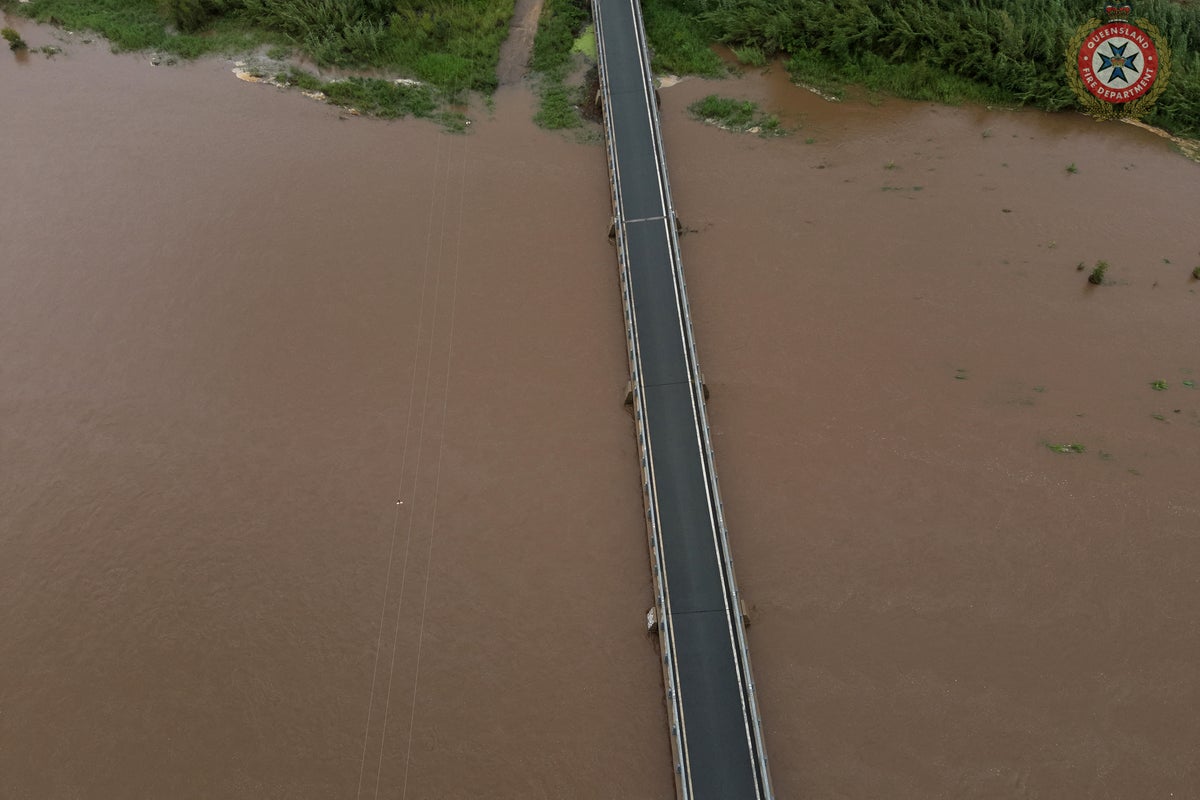
One person died, thousands were evacuated and a major bridge collapsed as torrential rains inundated large parts of Queensland in what is feared to be one of Australia’s worst flooding in more than 60 years.
Part of the Bruce Highway – Queensland’s main transport artery stretching over 1,600km – has been washed away after days of relentless rain, severing critical supply routes and adding hundreds of kilometres to emergency detours.
The collapse of the Ollera Creek Bridge has left communities stranded and complicated rescue efforts in a region already overwhelmed by floodwaters.
In Ingham, a 63-year-old woman died on Sunday when a rescue dinghy capsized after striking a submerged tree. Five others were pulled from the water, but the woman could not be saved.
Queensland premier David Crisafulli called the incident a heartbreaking loss for the close-knit town.
“Our thoughts are with her family during this devastating time,” he said.

The floods, described as the worst in more than 60 years, have inundated homes, submerged roads, and forced mass evacuations across Townsville, Ingham, and Cardwell. Mobile phone networks were down in many areas, leaving residents unable to contact each other.
More than 400 people are sheltering in emergency evacuation centres, with thousands more ordered to leave their homes as rivers surge beyond capacity.
Some areas have received nearly 1.3m of rain since Saturday – six months’ worth of rainfall in just three days.
The Herbert River in Ingham has surged to nearly 15m, approaching the catastrophic levels of the 1967 floods. Authorities warn that water levels could rise even higher in the coming days, threatening to inundate up to 2,000 homes, with floodwaters reaching as high as second-story windows in some cases.
Queensland Fire and Rescue crews have rescued nine people and assisted more than 50 people from flood impacted areas over the past 24 hours.
— Queensland Fire Department (@QldFireDept) February 2, 2025
Swiftwater firefighters remain on the ground from Mackay up to Cairns, ready to answer calls for help.
Flash flooding is an increased risk… pic.twitter.com/mrMFdCNqjE
The damage to the Bruce Highway has paralysed the national highway in the state’s north. The Queensland Trucking Association has warned that detours around the collapsed bridge will add up to 700km to key routes, delaying the delivery of food, medical supplies, and emergency equipment.
Locals fear if the repair isn’t completed soon and supplies don’t reach, the shelves in markets will be starting to empty soon.
“If this bridge works is not done and urgently, people up here are going to be running out of food and water,” landowner Joe Girgenti who lives at Mutarnee, a highway town between Townsville and Ingham, told ABC News.
Mr Crisafulli said regional Queensland was “at the mercy” of the Bruce Highway, and efforts would be made to repair the Ollera Creek Bridge as soon as possible.
“It must be repaired, and repaired swiftly,” he said.
In Townsville, a city of 200,000 people, emergency alerts have been issued, warning residents in the most flood-prone neighbourhoods – dubbed the “black zone” – to evacuate immediately.
“Your life may be at risk,” officials warned, adding that once floodwaters rise further, emergency services may be unable to reach those who remain.
The floods have created dangers beyond the rising waters with crocodile sightings reported in flooded streets, with Queensland’s Department of Environment warning that the reptiles are likely to appear in unusual places as they seek calmer waters.
“Expect crocodiles in all north and far north Queensland waterways, even if there is no warning sign,” the department said.
Widespread power outages have left thousands without electricity, cutting off communications for entire neighbourhoods. Authorities have warned of disruption to water supply.
This is a FLOOD ADVICE from the Charters Tower Local Disaster Management Group for CHARTERS TOWER. There has been a disruption to water supply to Charters. Please conserve your water use immediately to emergency use only – drinking and toilets. https://t.co/cBMnmDJDCW pic.twitter.com/iarp4ow0RO
— Queensland Police (@QldPolice) February 3, 2025
The State Emergency Service (SES) said it received over 480 emergency calls overnight and conducted 11 swift water rescues. However, officials fear the actual number of people in need may be much higher due to the communication blackout in some areas.
Prime minister Anthony Albanese, who has been briefed on the disaster, described the situation as heartbreaking and promised federal support.
“We will provide whatever resources are required to deal with this event,” he said.
The flooding has also raised concerns for Queensland’s mining sector, with Townsville serving as a major processing hub for zinc, silver, lead, copper, and iron ore. The 2019 floods severely disrupted mining operations in the region, and similar impacts are expected if rail lines and roads remain submerged.
Meteorologists warn that although the rain may ease slightly, the risk of flash flooding and damaging winds remains high. Some areas have seen up to 600mm of rain in just 24 hours, with forecasts predicting more heavy downpours in the coming days.
The forecast of >1m rainfall totals was proven true in northern #Queensland with another 300-800mm possible between #Ingham and #Bowen in the coming days. Widespread Major flooding is now impacting the region with rivers set to rise further. #TownsvilleFloods pic.twitter.com/gj6uTXxACg
— Alison Osborne (@Alison_Osborne_) February 2, 2025
Authorities have urged residents to avoid floodwaters, stay off the roads, and check on vulnerable neighbours.
“It only takes 30cm of flowing water to float a car,” SES deputy commissioner Shane Chelepy warned. “Don’t take unnecessary risks.”







